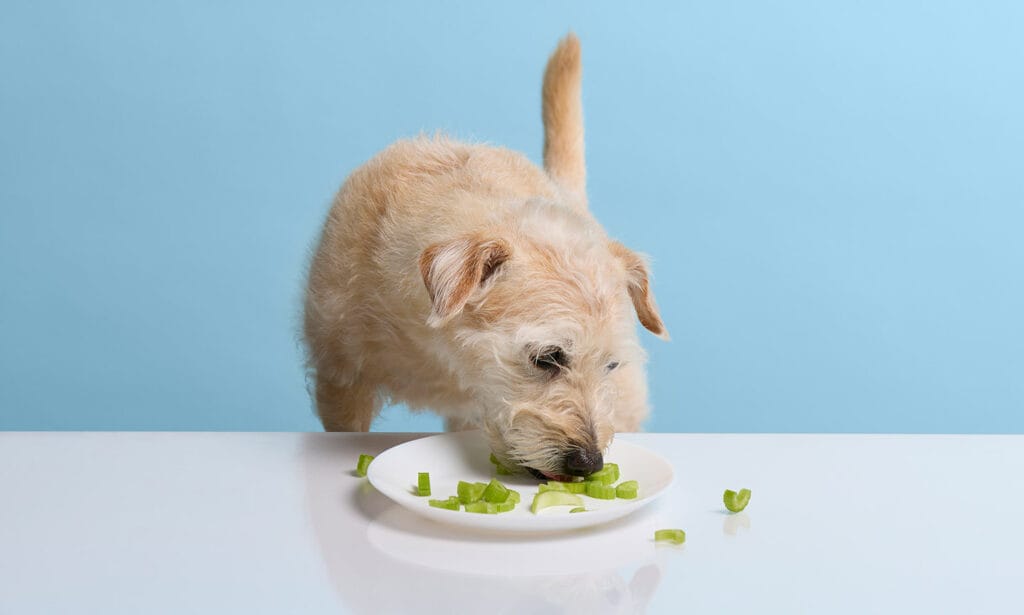Celery is a popular vegetable often used in salads, soups, and as a healthy snack. Many dog owners may wonder if their furry friends can also enjoy this crunchy green treat. The short answer is yes, dogs can have celery, and it can even provide some health benefits.

Celery is low in calories and high in fiber, making it a great addition to a dog's diet. It also contains vitamins such as A, C, and K, as well as minerals like calcium and potassium. However, it is important to note that celery should only be given to dogs in moderation and as a supplement to their regular diet. Too much celery can cause stomach upset or diarrhea, and the stringy texture can be difficult for some dogs to digest.
Nutritional Benefits of Celery for Dogs
Dogs can benefit from consuming celery as it is a low-calorie, nutrient-dense vegetable. Celery is a great source of vitamins, minerals, and fiber, which can help improve a dog's overall health. Here are some of the nutritional benefits of celery for dogs:
Vitamins and Minerals
Celery is a good source of vitamins A, C, and K, as well as potassium, folate, and manganese. These vitamins and minerals can help support a dog's immune system, aid in digestion, and promote healthy bones.
Fiber Content
Celery is also high in fiber, which can help regulate a dog's digestive system and prevent constipation. Fiber can also help a dog feel full and satisfied, which can be helpful for dogs that are trying to lose weight.

Low-Calorie Treat Option
Celery is a great low-calorie snack option for dogs. It is a healthy alternative to high-calorie treats and can help prevent obesity in dogs. Additionally, the crunchiness of celery can help clean a dog's teeth and freshen their breath.
Overall, celery can be a great addition to a dog's diet in moderation. It is important to note that too much celery can lead to digestive issues, so it should be given in small amounts as a treat or added to their regular meals. As with any new food, it is recommended to introduce celery slowly and monitor your dog's reaction.
How to Safely Feed Celery to Dogs
Celery is a nutritious vegetable that can be safely fed to dogs in moderation. However, like any human food, it is important to know how to properly feed celery to dogs to avoid any potential health risks. Here are some guidelines to follow when feeding celery to your furry friend.
Proper Portion Size
The portion size of celery depends on the size of your dog. As a general rule, small dogs should be given smaller portions than larger dogs. A good guideline is to give your dog one or two small pieces of celery as a treat, and no more than a few times a week. It is important to remember that celery should not be a substitute for a balanced and complete dog diet.
Choking Prevention
Celery can be a choking hazard for dogs, especially for small dogs. To prevent choking, it is important to cut the celery into small pieces before feeding it to your dog. This will make it easier for your dog to chew and swallow. Additionally, it is always a good idea to supervise your dog while they are eating to ensure they are not having any difficulty.
Combining Celery with Other Foods
One popular way to feed celery to dogs is by combining it with other foods. For example, "ants on a log" is a popular snack that consists of celery sticks filled with peanut butter and topped with raisins. While this can be a tasty treat for your dog, it is important to remember that peanut butter should be given in moderation due to its high fat content. Additionally, it is important to make sure that the raisins are removed, as they can be toxic to dogs.

Overall, celery can be a healthy and safe addition to your dog's diet when fed in moderation and with proper precautions. By following these guidelines, you can safely feed celery to your furry friend and provide them with a tasty and nutritious treat.
Potential Health Concerns
Risks of Feeding Celery
While celery is generally safe for dogs to consume, there are some risks to be aware of. One risk is that celery can be a choking hazard, especially for small dogs. To avoid this risk, it is recommended to cut the celery into small pieces before feeding it to your dog.
Another risk is that celery can be difficult for some dogs to digest, particularly if they have a sensitive stomach. This can lead to gastrointestinal upset, including vomiting and diarrhea. If your dog experiences these symptoms after eating celery, it is best to avoid feeding it to them in the future.
Signs of an Upset Stomach
If your dog does experience an upset stomach after eating celery, there are a few signs to watch out for. These can include vomiting, diarrhea, loss of appetite, and lethargy. If you notice any of these symptoms, it is important to monitor your dog closely and seek veterinary care if necessary.
Foods to Avoid
While celery is generally safe for dogs to eat, there are some foods that should be avoided. Grapes and raisins, for example, can be toxic to dogs and should never be fed to them. Additionally, foods that are high in fat and calories can contribute to obesity, which can lead to a variety of health problems. It is important to feed your dog a balanced diet that is appropriate for their age, weight, and activity level.
Comparing Celery to Other Dog-Friendly Vegetables
When it comes to feeding vegetables to dogs, celery is one of the options that many pet owners consider. While celery can be a healthy addition to a dog's diet in moderation, it's important to know how it compares to other dog-friendly vegetables.
Celery Versus Carrots
Carrots are a popular vegetable for dogs, and for good reason. They are low in calories, high in fiber, and packed with nutrients like beta-carotene, vitamin K, and potassium. When compared to celery, carrots are a better source of vitamin A, which is important for maintaining healthy vision, skin, and coat.
Celery, on the other hand, is lower in calories and higher in water content than carrots. It's also a good source of vitamin K, which is essential for blood clotting, and contains small amounts of other nutrients like folate and potassium.
Both celery and carrots can be a healthy addition to a dog's diet, but it's important to keep portions small and avoid feeding too much of either vegetable.

Safe Alternatives to Celery
If you're looking for other dog-friendly vegetables to add to your pet's diet, there are plenty of options to choose from. Here are a few safe alternatives to celery:
- Cucumbers: Low in calories and high in water content, cucumbers are a refreshing snack for dogs.
- Pumpkin: Rich in fiber and beta-carotene, pumpkin can help regulate digestion and support immune function.
- Carrots: As mentioned earlier, carrots are a great source of nutrients and a healthy addition to a dog's diet.
- Blueberries: These antioxidant-rich berries are a great source of vitamins C and K, as well as fiber.
- Broccoli: High in fiber and vitamin C, broccoli can help support digestive health and boost the immune system.
- Green beans: Low in calories and high in fiber, green beans are a great source of vitamins A, C, and K.
- Asparagus: Rich in fiber and vitamins A, C, and K, asparagus can help support digestive and immune health.
Overall, when it comes to feeding vegetables to dogs, it's important to choose options that are low in calories, high in fiber, and packed with nutrients. While celery can be a healthy addition to a dog's diet in moderation, there are plenty of other safe alternatives to choose from.
Incorporating Celery into Your Dog's Diet
Introducing New Foods
When introducing new foods to a dog's diet, it is important to do so gradually. This allows their digestive system to adjust and prevents any potential stomach upset. Celery can be a great addition to a dog's diet as it is low in calories and high in fiber. However, it should be noted that not all dogs may enjoy the taste or texture of celery. It is recommended to start with small pieces and observe their reaction before incorporating it into their regular diet.
Balancing Celery with Regular Dog Food
While celery can be a healthy addition to a dog's diet, it should not replace their regular dog food. It is important to maintain a balanced diet that includes all necessary nutrients. Celery can be given as a snack or added to their regular dog food as a refreshing treat. It is also important to note that while celery does contain calcium, it is not a significant source of the mineral and should not be relied upon as the sole source of calcium in a dog's diet.
When incorporating celery into a dog's diet, it is important to avoid any seasonings or toppings that may be harmful to dogs such as salt, garlic, or onion powder. Plain, raw celery is the safest option for dogs. Overall, celery can be a healthy addition to a dog's diet when given in moderation and as part of a balanced diet.
Conclusion
In conclusion, celery can be a beneficial and enjoyable addition to your dog's diet when offered in moderation and with the appropriate precautions. This low-calorie vegetable, high in fiber and rich in essential vitamins and minerals, can support your dog's digestive health, immune system, and overall well-being. While celery presents a healthy snack option, it's crucial to introduce it gradually to your dog's diet to avoid any potential digestive issues and to ensure it is given in small, manageable pieces to prevent choking hazards.
Remember to keep celery as a supplement to a balanced diet, not a replacement for your dog's regular meals, and to avoid any unhealthy toppings that could harm your dog. With careful consideration and moderation, celery can be a refreshing, nutritious treat that contributes positively to your furry friend's diet.
FAQs
- Can dogs eat celery?
- Yes, dogs can eat celery. It is a low-calorie snack that is high in fiber and rich in vitamins A, C, and K, as well as minerals like potassium and calcium. However, it should be given in moderation as part of a balanced diet.
- What are the benefits of feeding celery to dogs?
- Feeding celery to dogs can provide several health benefits, including aiding digestion due to its high fiber content, supporting the immune system with its vitamins and minerals, and serving as a low-calorie treat that can help with weight management. The crunchiness of celery can also help clean a dog's teeth.
- How much celery can I give to my dog?
- The amount of celery you can give to your dog depends on their size. A general guideline is one or two small pieces of celery as a treat, no more than a few times a week. Always ensure that celery is given as a supplement to their regular meals, not as a replacement.
- Are there any risks associated with feeding celery to dogs?
- While celery is generally safe for dogs, it can pose a choking hazard, especially for small dogs, so it's important to cut it into small, manageable pieces. Additionally, too much celery can lead to digestive upset in some dogs. Always introduce new foods, including celery, gradually and monitor your dog's response.
- Can celery cause any digestive issues in dogs?
- Yes, in some cases, celery can cause digestive issues such as stomach upset or diarrhea, especially if given in large quantities or if the dog has a sensitive stomach. Start with small amounts and observe how your dog reacts.
- How should I prepare celery for my dog?
- Celery should be washed thoroughly and cut into small, bite-sized pieces to prevent choking. Avoid adding any seasonings or toppings that could be harmful to dogs, such as salt, garlic, or onion powder. Raw, plain celery is the safest option for dogs.
- Are there any alternatives to celery for dogs?
- Yes, there are many dog-friendly vegetables that can be good alternatives to celery, including carrots, cucumbers, pumpkin, blueberries, broccoli, green beans, and asparagus. These should also be given in moderation and prepared safely to avoid any health risks.





